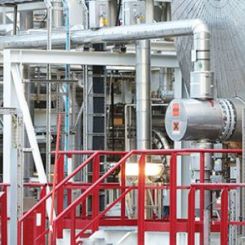
Mechanical seals play a crucial role in industrial processes by preventing fluid leakage and maintaining system integrity in pumps and rotating equipment. However, these seals can be susceptible to overheating, abrasion and dry running in high-demand environments. Excessive heat can degrade seals, leading to failure and unplanned maintenance, while excessively cold fluid can increase viscosity and reduce efficiency.
Mechanical seal support systems mitigate these risks by controlling cooling and lubrication and regulating temperature. These systems ensure that seals operate within an optimal temperature range, reducing wear and extending their lifespan. Without proper temperature management, mechanical seals that rely on cooling water may waste thousands of gallons annually, leading to higher operational costs and increased environmental impact.
A well-designed mechanical seal support system helps:
- Maintain continuous and reliable operation
- Minimize system breakdowns due to overheating or dry-running
- Ensure proper lubrication for optimal seal performance
- Prevent excessive wear leading to costly failures
- Improve overall equipment efficiency and longevity
By proactively managing the temperature of seal cooling water, facilities can optimize water consumption, eliminate unnecessary waste and reduce maintenance-related expenses.
Typical Applications
Mechanical seals are used in industrial industries such as food and beverage, pharmaceutical and chemical processing, which rely on pumps, mixers and reactors to handle various substances. Proper thermal management is crucial in these applications to ensure smooth operations, prevent contamination and comply with strict industry regulations.
For example, pumps transport liquids such as syrups and soda in food and beverage processing, often requiring mixers and agitators to maintain consistency. Without proper mechanical seal temperature control, these processes can suffer from inefficiencies, increased maintenance and potential product contamination. Similarly, in pharmaceutical production, maintaining precise thermal conditions within processing equipment is essential to uphold sterility and product integrity.
By incorporating a seal support system, facilities can enhance equipment performance, reduce downtime, lower maintenance costs and ensure regulatory compliance across various industries.
The Benefits of a Self-Actuating Mechanical Seal Support Valve
One effective solution for protecting pump seals is a thermostatic seal support valve. Installed on the seal’s water outlet, this valve automatically regulates a constant water outlet temperature, ensuring it remains within the ideal operating range. Unlike manually adjusted or electronically controlled systems, this self-actuating valve operates independently, responding in real time to temperature fluctuations. Seal support valves monitor water temperature and automatically adjust the water required, preventing overheating and seal failure. Since they operate thermostatically, there is no need for external power or continuous human oversight, reducing operational errors such as manually opening or closing water valves.
Implementing a thermal management valve offers several advantages:
- Consistent seal support: Maintains a steady water outlet temperature to protect seals from thermal damage
- Water conservation: Reduces unnecessary water use, lowering operational costs
- Reliable performance: Operates thermostatically without external
power, making it ideal for demanding industrial applications
Boost Efficiency & Reduce Water Use
Reducing seal water consumption lowers water usage, enhancing system reliability and decreasing maintenance expenses.
Seal support valves protect seals by using water only when necessary. As industries continue to seek ways to optimize resource consumption, these valves provide a reliable and cost-effective solution for mechanical seal water management.
For more information on mechanical seals, visit pumpsandsystems.com/tags/mechanical-seals.

